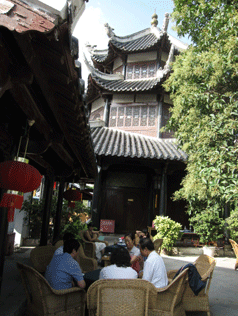Traveling for tea in Guiyang
By Tiffany Tan ( China Daily)
Updated: 2014-11-07
Tiffany Tan takes a closer look at the provincial capital, Guiyang.?
|

|
|
Guiyang residents drink tea and play games under the eaves of Wenchang Pavilion. [Tiffany Tan / China Daily] |
Tea is literally at the center of the lives of the people of Guiyang. Jiaxiu Pavilion, a 16th century structure considered the "symbol of Guiyang", and located in the heart of the city, now serves as a tea house.
It lies along Nanming River, a 118-km body of water that runs through this capital of Guizhou province. At night, the river ripples with the color of lights from surrounding office buildings: blue, yellow, white, purple, and green. During the day, many retirees congregate around the three-story pavilion's base, to fly their kites.
Jiaxiu, meaning "prominent talents on earth", was built in 1598, an embodiment of Guiyang's desire to produce outstanding individuals. Three centuries later, a native of the city - and the first to hail from southwestern China - topped the imperial civil service exams.
Despite being surrounded by major thoroughfares, the pavilion and its teas provide respite from the hectic pace of city life. Tables and chairs are set up in the patio, with a railing of carved white stone, overlooking the river.
Less than a kilometer north of Jiaxiu, nestled among apartment buildings, is another ancient structure-turned-tea house.
The Wenchang Pavilion was built in 1609 to commemorate three men, including Guan Yu, a prominent general during the Three Kingdoms Period (AD 220-280). The three-story pavilion's composition reflects the Chinese people's belief in the auspiciousness of the number nine: nine corners, 18 rafters, 54 columns and 81 beams.
The ground-floor hall has been turned into an exhibition area of China's most popular pavilions. The photographs there include Hubei province's Huanghe Pavilion, Hunan's Yueyang Tower and Jiangxi's Tengwang Pavilion.
Tables and chairs for tea drinkers can be found under the pavilion eaves, as well as in the small adjoining yard. The residents of Guiyang are big mahjong players, and they'll usually indulge in this - or card games - while sipping tea and munching on pumpkin seeds.
Guizhou is China's second largest tea-producing province. Among green tea growers, it ranks No 1.

